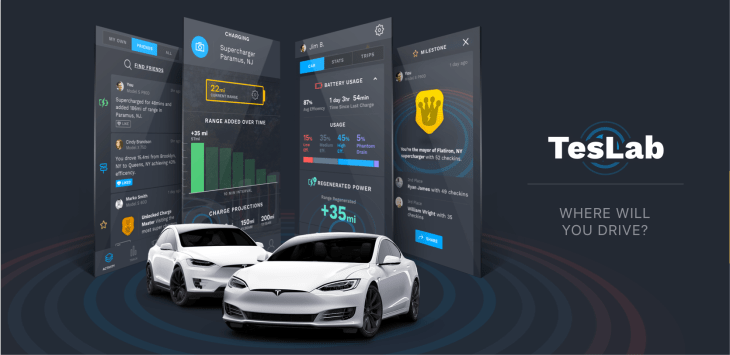Tesla actually makes a lot of data available to vehicle owners via APIs and other endpoints, but it’s not always easy to find and make use of that info. Enter TesLab, a new app that tracks data and links it to your profile, while also letting you share it out to a community of other Tesla owners in a way that, during the beta spotted by Teslarati, users have really enjoyed.
The app doesn’t require much on the user’s end. Basically you install it on your mobile device, connect your car and create an account (Facebook and Twitter login required for now, though that’s changing soon with original account creation directly in the app). It then monitors your trips, looking at factors including average speed, starts and stops, braking and more. Based on that info, it’ll tell you your overall efficiency (as a percentage of the total ideal mileage rating for the vehicle).
You can see this info as a color-coded heat map on a literal map, showing you where exactly you dipped below max efficiency and where you performed best. The app displays a total efficiency percentage for the trip, too, as well as total time driving, actual miles driven versus charge depleted as represented in miles and the average temperature — along with that most celebrated of EV stats, gas money saved.
“We both drive Teslas and we’re both really passionate about alternative energy, let’s dig into the technology behind Tesla and let’s see how far they’ll let us go, not being employed by Tesla,” said TesLab co-creator and HappyFunCorp co-founder Ben Schippers in an interview, explaining how he and partner Will Schenk came up with the app. “We also saw an opportunity because you buy this really nice car, and then you have this app and the car is super connected, but the app is not super exciting.”
 “We thought, what if we could build a framework for what the connected car could be,” Schippers continues. “What if Tesla gave us enough access to our individual cars that we could build a community around what we envision the connected car of the future could be, across all connected cars?”
“We thought, what if we could build a framework for what the connected car could be,” Schippers continues. “What if Tesla gave us enough access to our individual cars that we could build a community around what we envision the connected car of the future could be, across all connected cars?”
TesLab is the result of that experiment, and it does pull a lot of data from your vehicle, and attempts to answer that infinitely debated question among EV owners: How much range am I actually getting, as compared to the EPA rating, and why am I seeing the range I’m seeing? It can even provide data on a phenomenon known in the community as “phantom drain,” which is how much range your vehicle loses just from sitting idle between charges, which is hugely dependent on outdoor temp, among other factors.
Schippers and Schenk made a bet that Tesla owners would be willing to share a lot of information regarding their trips and their vehicles, including specific location data, in exchange for that kind of return info and an active community. It’s essentially the same bet Mark Zuckerberg made with Facebook early on, Schippers tells me, but in the specific realm of Tesla owners instead. But the idea isn’t to keep it limited to the exclusive Tesla driver club forever.
“We believe Chevy, and Ford, and BMW and all the big car manufacturers are going to see this and are going to say ‘we should do that, this is the connected framework people are going to want when they buy these cars,'” Schippers said. They key to driving appeal among other makers of EVs will be showing the momentum they’ve already captured with the Tesla community, and growing that with Tesla’s forthcoming entry into the mass market will be a key step toward that goal.
[gallery ids="1454236,1454235,1454234"]
“We already have a huge percentage of the Model X and Model S owners on the beta, and now we need to really focus on getting to the Model 3,” he added. “Once we get to the Model 3, I think it’s game over. Once we get to the Model 3, I think we’ll really be able to show what you can do with a massive amount of data.”
That includes things like crowdsourcing information about Supercharger occupancy, as well as putting a finer point on real-world range that incorporates factors like weather and road conditions, as well as hyper-local gas pricing to show you more exactly how much you’re saving. But it also means extending the app’s current connected controls, which allow remote unlocking and climate settings, to the connected home, too.
“People that drive Teslas, they have a Nest [connected thermostat], so we’ll be able to start doing things from the car to the home,” Schippers explains. “We’ll be able to pre-condition your house, we’ll be able to pre-condition your oven, because we know where you are in space. Once we know where you are in space, then we can connect all the other devices.”
